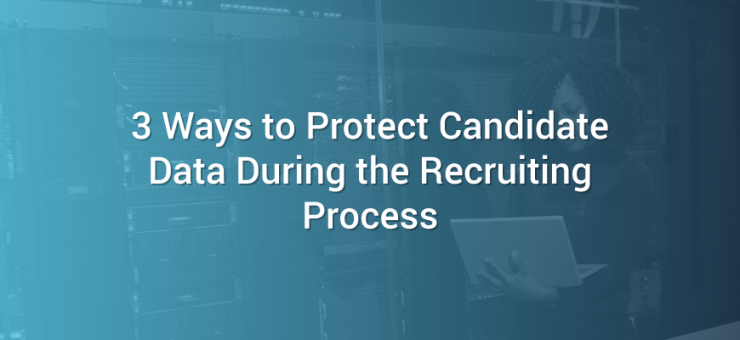To attract the most qualified and enthusiastic candidates, your hiring team needs to do more than just create effective job ads. One of your top priorities should be protecting candidate data. Otherwise, no one will want to share their private information with you.
Historically, hackers go after data they can use, like credit card information. While you won’t be collecting payment data, you’ll be receiving other data that’s just as private, like social security numbers and home addresses.
Confidentiality is crucial in the hiring process. It’s the key to establishing trust with job candidates. With technology continuously expanding, maintaining privacy is becoming more and more difficult.
To avoid a data breach and a PR scandal, protect your job candidates’ data by doing the following:
- Use an authentication tool.
- Choose secure software.
- Limit access to data.
Not only can a data breach deter potential employees from applying, but it can also drive potential customers away. Ready to start protecting your applicants’ information? Let’s get started!
1. Use an authentication tool.
A major first step in securing data is using an authentication tool. For those who are new to cybersecurity, authentication ensures your users are who they say they are. Otherwise, unauthorized users can hack your website, leaving no trace behind.
While there are a number of authentication tools on the market, your best bet is to go with a multi-factor authentication tool. For this authentication process, users take two login steps:
- They enter their traditional login credentials (i.e. username and password).
- Then, they enter a passcode that was sent to their phone, email, or authenticator app.
This form of authentication is much safer than other additional steps, like security questions. If you’re worried about speed, look into SSO authentication, which is just as secure and allows you to closely monitor what devices access candidates’ accounts.
2. Choose secure recruiting software.
From video interviewing software to CRM systems, your company will need to invest in secure technology.
As a general rule of thumb, research various software vendors prior to investing. To kick off your research, check to see if potential providers have a history of data breaches and how they’ve dealt with it.
Make sure the vendor is transparent in its communication. Then, check to see if it has an accessible document that lays out its security precautions for protecting data.
Once you invest in new tech, avoid transferring candidate data across multiple devices. Instead, use your secure software as a centralized hub for all candidate information.
While recruitment software is great for developing strong relationships with candidates, there’s no replacement for security. Remember, if they don’t know if their information will be protected, even the most qualified candidates won’t want to apply in the first place.
3. Limit access to data.
If there’s a data breach, chances are that both employees and job candidates are at fault for unsafe practices. One way to combat this is by limiting access.
In most cases, only recruiters and higher-ups should be able to access pertinent candidate data. To take security to the next level, do the following:
- Require passwords for all accounts. Without passwords, anyone can guess your candidates’ or employees’ email addresses. Then, they’ll have unlimited access to data.
- Limit employee access to certain candidates’ profiles. Not every employee needs access to all the data in your system. Instead, limit an employee’s access to those that are only relevant to their position.
- Enforce password standards. For those who do have access to candidate data, have password requirements. Whether it’s a password alternative or a minimum number of password characters, don’t overlook this step. To learn more, visit Swoop’s password alternatives guide.
Remember, anyone who has access to applicants’ profiles is responsible for protecting this data. This goes for candidates, too. However, if a breach occurs, all eyes will fall on your company. Make sure everyone is up-to-date on the best security protocols, and limit access as best as you can.
As part of your company’s hiring team, you’re responsible for implementing the necessary safety precautions. From switching to new recruitment software to enforcing password requirements, security is a must.
Now that you know the best cybersecurity practices, start protecting your candidates’ private data before it’s too late!
About the Author
 John Killoran is an inventor, entrepreneur, and the Chairman of Clover Leaf Solutions, a national lab services company. He currently leads Clover Leaf’s investment in Swoop, an authentication service that eliminates the need for passwords on websites and apps.
John Killoran is an inventor, entrepreneur, and the Chairman of Clover Leaf Solutions, a national lab services company. He currently leads Clover Leaf’s investment in Swoop, an authentication service that eliminates the need for passwords on websites and apps.
Swoop launched in late 2018 and helps software providers upgrade their single or multi-factor login experience and shed obsolete passwords. With Swoop, instead of logging in, users “message in” with two taps: one to create a pre-addressed email and the second to send it. Authentication is secured by cryptographic keys inserted by the email server—infinitely more secure than a password. Swoop is now the authentication expert for teams that build everything from data analytics platforms to e-commerce apps.











